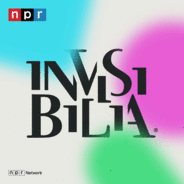In this episode, we talk to a 74-year-old woman who decides the only way to get over her husband's death is to jump out of an airplane. And to a third generation beekeeper whose entire collection of hives has been stolen - he believes by Russian mobsters. After losing so much can they tell themselves new stories about themselves that allow them to function?Learn more about sponsor message choices: podcastchoices.com/adchoicesNPR Privacy Policy

Wissenschaft & Technik
Invisibilia Folgen
Unseeable forces control human behavior and shape our ideas, beliefs, and assumptions. Invisibilia—Latin for invisible things—fuses narrative storytelling with science that will make you see your own life differently.
Folgen von Invisibilia
88 Folgen
-
Folge vom 09.03.2018I, I, I. Him
-
Folge vom 23.02.2018Season 4 TrailerWe're living in a black and white world, where the stories we tell ourselves lock us into one side or the other. These stories define us – imprison or liberate us. In their fourth season, co-hosts Hanna Rosin and Alix Spiegel map the grey areas.Learn more about sponsor message choices: podcastchoices.com/adchoicesNPR Privacy Policy
-
Folge vom 22.12.2017BONUS: Catch-Up with Max HawkinsIn this bonus episode, we catch up with a character from Season 3 of Invisibilia... Max Hawkins, a San Francisco-based computer programmer who initially built an app to help him break out of his predictable bubble. Recently, Max, and others he's inspired to "bubble-hop," have been led to confront situations they feel have crossed the line from uncomfortable...to morally repugnant. These experiences have meant grappling with when to shut down, and when to engage. Invisibilia is supported by GoToMeeting: https://www.gotomeeting.com/Learn more about sponsor message choices: podcastchoices.com/adchoicesNPR Privacy Policy
-
Folge vom 12.09.2017BONUS: Catch-Up with Bill MillarIn a special podcast bonus, co-host Hanna Rosin checks in with Bill Millar, who we met in Season 2's "Flip the Script." They talk about dating, cats, and how love can look different for everyone. Listen to the original episode here: http://apple.co/2x0aWE3.Learn more about sponsor message choices: podcastchoices.com/adchoicesNPR Privacy Policy
